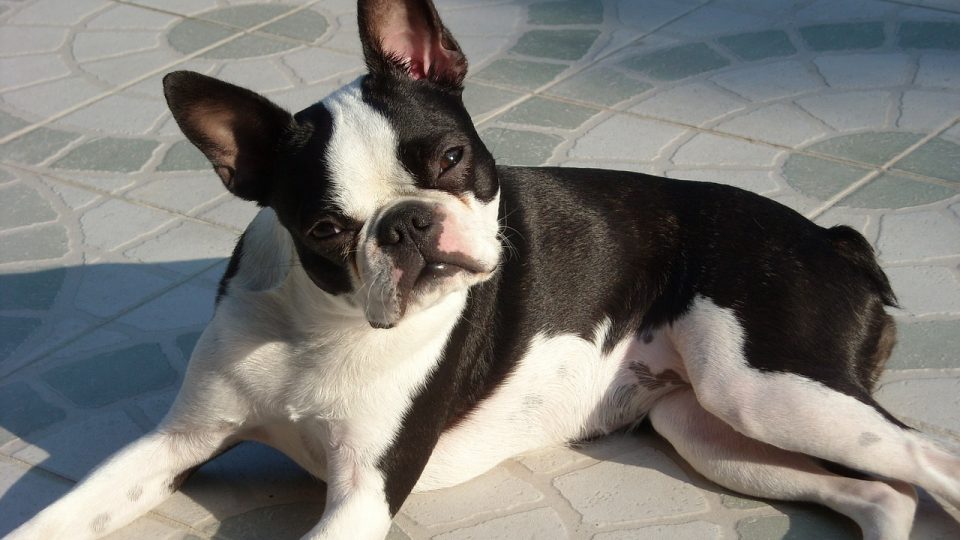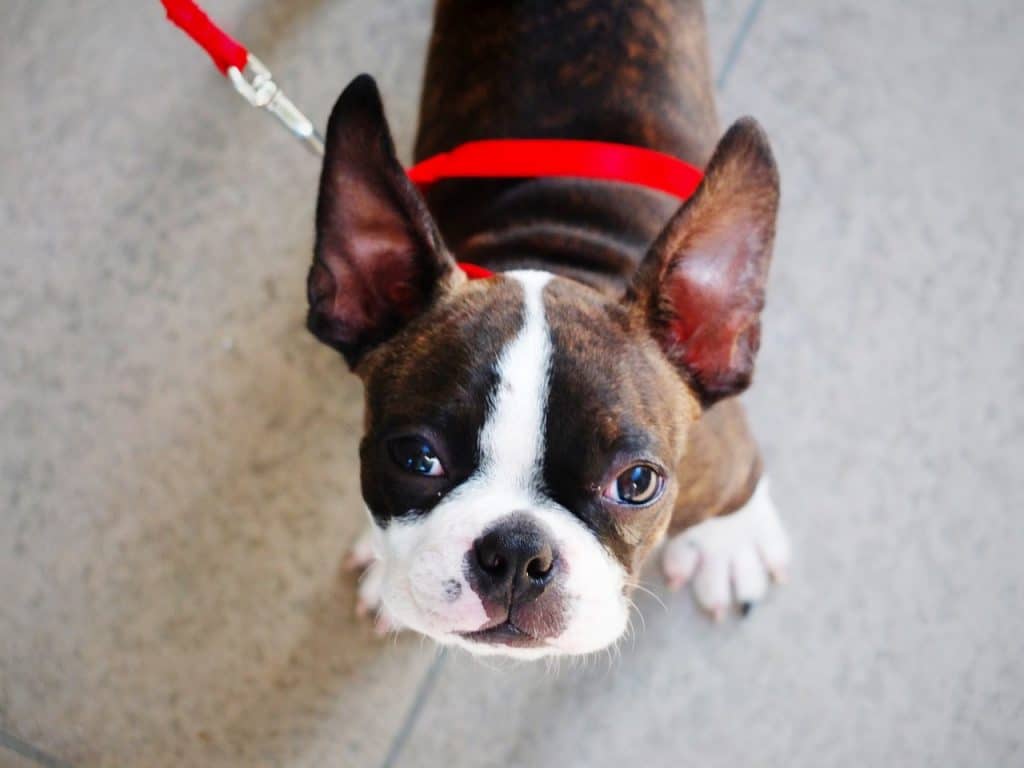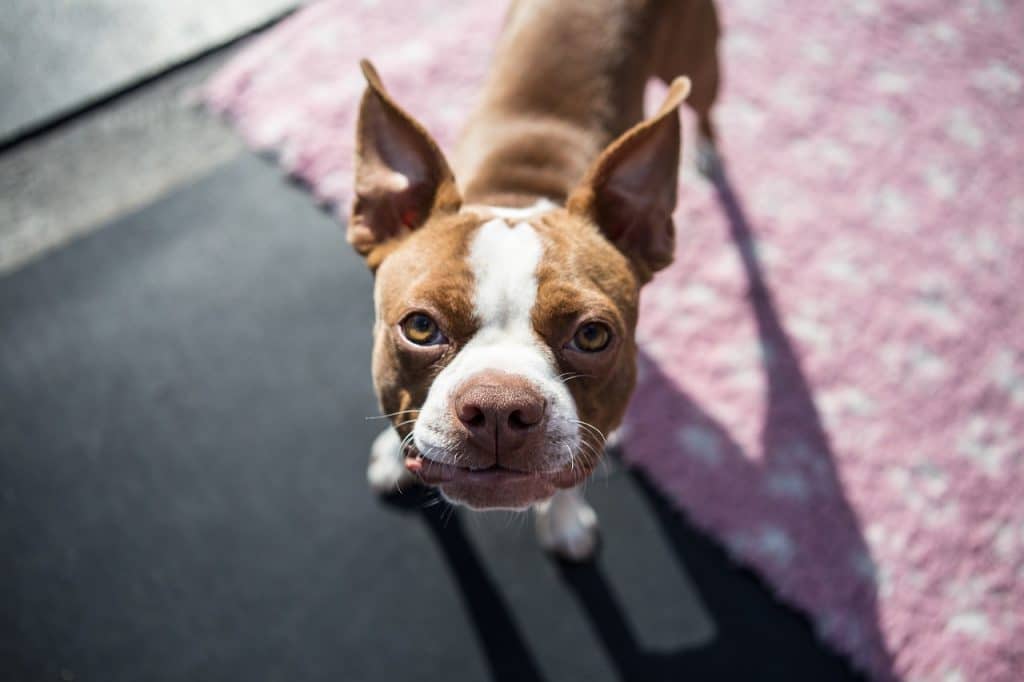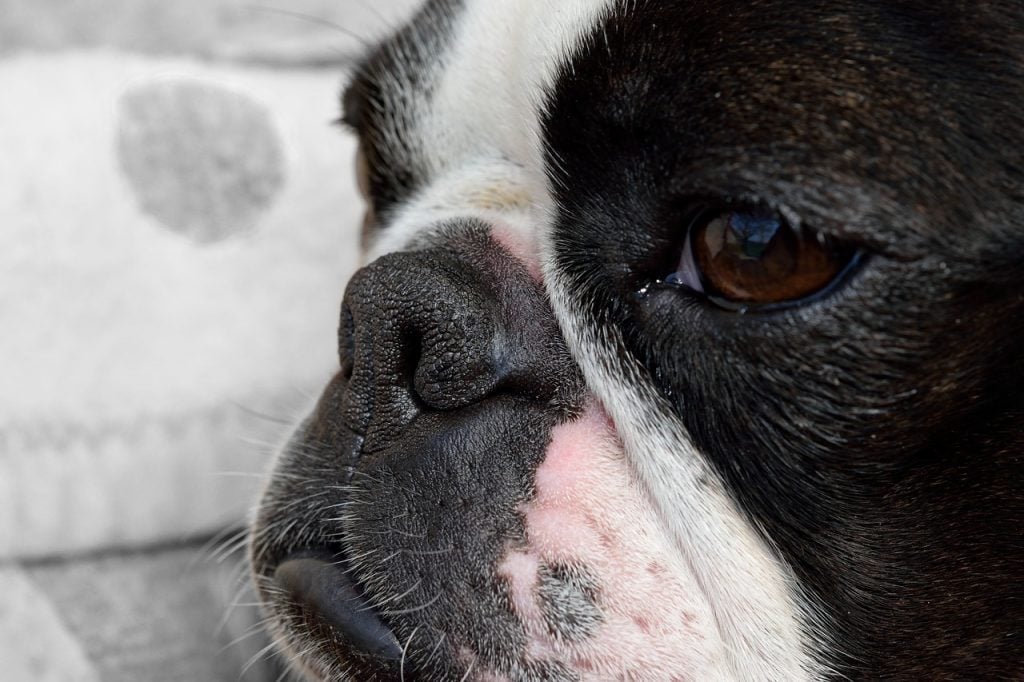Always dressed to impress, America’s “gentleman dog” is known for his stylish tuxedo look and big, endearing eyes. But there’s more to the Boston terrier than his stately appearance—Boston terrier owners describe their beloved dogs as energetic, friendly and fun-loving. Get the facts you need about this stylish and sporty breed if you’re considering adding a Boston to your family.
Boston Terrier History
As you might have wagered, the Boston terrier is an all-American dog hailing from…Boston. But what you might not have guessed is that the Boston terrier (who is often mistaken for a type of bulldog) is actually a cross between an English bulldog and an English terrier.
All modern Boston terriers are descendants of a dog named “Judge”, who lived in Boston in the 1860s. It didn’t take long for the breed to gain popularity, and the rest is, well, history.
Breed Characteristics
According to the the American Kennel Club, the Boston Terrier is a smart and energetic dog, which probably helps to make these sweet guys one of America’s most popular dogs (currently #21 on the list, but who is counting?). These little guys do, however, have a few other highly endearing traits that aren’t listed in the breed standard.
- Gassy
- Picky eaters
- Prone to snoring, grunting, snorting…you get the idea
- Highly trainable
- A good watchdog
Yes, it’s true…many owners report that their little gentlemen can be quite gassy, but it’s one of those features that can make these dogs all the more lovable and silly. And like the gas, the snoring, grunting, etc., just adds to their big personalities.
Interestingly enough, these little guys can be quite selective with their eating, which can make mealtime tricky for owners. It can be a struggle to make sure they eat enough food and eat good quality food, to boot.
A trait that all dog lovers respect is trainability. Boston terriers are not only described as easy to train, but they usually aren’t big on barking, unless there’s a reason to be excited. And of course, this translates into the potential to be a great watchdog.
Breed Appearance
As mentioned before, these sweethearts come dressed to impress with white and dark markings that are sometimes described as a “tuxedo”. There is, however, a bit of color variation in their soft, short coats.
According to the breed standard, black is probably the most common main color, but the Boston terrier can also be brindle or seal with even white markings. (For those of you wondering what “seal” looks like, it’s actually a variation of black that has reddish tints in the bright sun.)
These little guys are perhaps best known for their big, gentle eyes and cute, pointed ears, which look just a bit too big, and contribute to their trademark lovable appearance. Those ears are important though—they’re actually the best way to distinguish the Boston terrier from the French bulldog, who is a sort of Boston terrier doppelgänger!
As far as size goes, Boston terriers are small and compact dogs, rarely weighing over 25 pounds, but usually at least 15 pounds.
Boston Terrier Personality
If these dogs are famous for their appearance, they are also very well known for their fun-loving personalities and extremely high energy-to-size ratio. Combine a natural silliness with a tendency for gas and you get an experience that keeps you on your toes and brings a smile to your face.
Besides these great qualities, owners often report on their sweetness, their intelligence and how easily they take to training.
Bostons are known for their love of games, whether it be a simple game of fetch or something a little more intellectually challenging. Games are a great way to exercise, to bond with, and to socialize your gregarious Boston.
Ideal Environment
The small stature of the Boston terrier makes it a versatile dog. Even though they are full of energy, they can be great apartment dogs or city dogs as long as they are well-exercised. These dogs do well with daily brisk walks, and then can be content to people watch and schmooze.
Their soft, sleek coats can be augmented with a stylish blanket in colder weather, but note that they can be prone to overheating. This means that they must have water and shade available all the time in any sort of heat.
One item of particular importance— these dogs aren’t fantastic swimmers, so should be watched even more closely when near any water.
Ideal Human
While Boston terriers aren’t described as high-maintenance dogs, they do have moderate exercise needs. Owners who have time to devote to regular walks or playtimes will probably find that their Boston terrier is a little easier to manage. Anyone who can appreciate their natural silliness and lovable personality can probably find room in their heart and home for a Boston terrier of their own.
Their size is also something to think about if you have children. Smaller dogs can be great for kids, and while the Boston terrier is a muscular dog (which makes him hardy and not overly delicate), children should be advised on how to gently handle their Boston terrier until they’ve learned the ropes.
Boston Terrier Training
Smart, enthusiastic, and eager to please, Bostons are ideal students. They can usually learn the basics (sit, stay, come, and leash training) pretty quickly. And while they are known to be picky eaters, this usually isn’t the case with treats, so you should be able to find a tasty treat to help incentivize them to learn.
According to dog obedience reviews, leash training is best undertaken early with Bostons, as they seem to adapt to it easier the earlier they learn.
One area where Boston owners can scratch their heads is house training. For some reason, Boston terriers can be slow to housebreak, but as with any breed, the key to housebreaking is consistency and patience. It may take a little bit longer, but your dog is sure to catch on sooner or later.
Another reported problem area is digging. As far as vices go, this one isn’t the worst, but it still can be troublesome for owners (and any neighbors that could also be impacted.) Bostons may resort to this when they are lonely or frustrated.
An important note: as with many dogs who are eager to please, they can also be sensitive to corrections. Be sure to follow corrections up with lots of love and reassurance to make sure your little guy moves through his training confidently.
Breed Health
Remember that endearing snoring issue? While many Bostons snore, for some, this can be a sign of a respiratory issue, which is actually quite common in dogs that have flat faces because of the structure of their nasal passages. While casual snoring is nothing to be alarmed about, intense snoring might warrant a more in-depth check-up, just to make sure your little guy isn’t having trouble breathing.
These known respiratory issues are another reason why it is so important to keep Boston terriers cool in the heat to ease their breathing.
In general, Bostons seem to have a healthy lifespan of 13-15 years. Some of the nagging issues that may plague them in their lifetime are things like eye and ear infections, allergies, and skin irritations, according to the American Society for Protection of Cruelty to Animals.
Getting a Boston Terrier Dog
So, do you think you are ready for a Boston of your own? Because these cuties are so popular, finding a breeder or even a rescue might not be that difficult. But as always, it’s important to do your homework to make sure you are using a responsible breeder.
Boston Terrier Rescues
The American Boston Terrier Rescue is a good place to start if you are interested in a rescue. Like many rescues, they will thoroughly screen applicants to ensure that homeless Boston terriers are likely to be placed in their forever home.
Similarly, Mid-America Boston Terrier Rescue is an organization that serves the American midwest. Because Bostons are so popular, you are bound to find a rescue in your area, and if nothing else, these organizations are a great place to learn more about Bostons.
Boston Terrier Breeders
The American Kennel Club provides a list of approved breeders that could help jump-start your research if rescue or your local shelter isn’t an option. You can also try your local vet for ideas on reputable breeders in your area.
Interested in learning more? Check out these Rover articles on Boston terriers:





